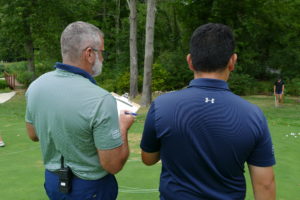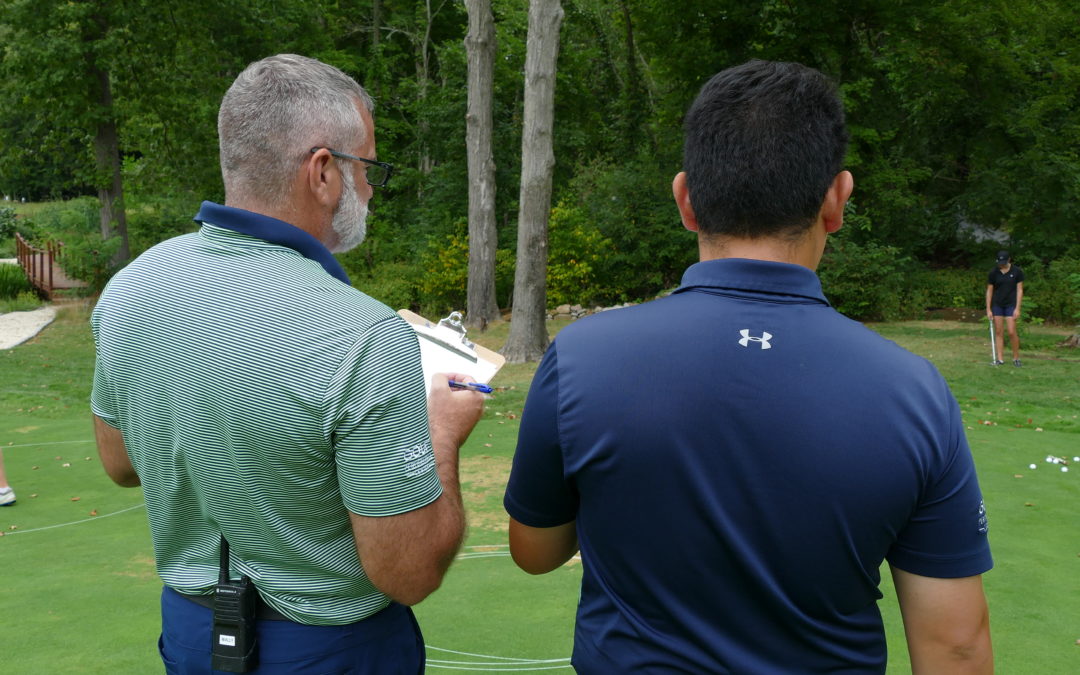The college golf recruiting process is a two-way street. You may be looking for the best golf team for you, but it’s also important to remember that college golf coaches are looking for the best fit for their programs, too.
Similar to our checklist for what to look for in a golf team, Junior Golf Hub also knows what golf coaches are generally looking for in recruits. Furthermore, we know how golf coaches go about their recruiting process. Armed with this information, you’re ready to impress your top choices with your initiative and determination.
What Are College Golf Coaches Looking for in a Recruit?

There are four main categories that college golf coaches look into when deciding how to fill their rosters each year: eligibility, golf skills, demeanor and academics (and not necessarily in that order). This goes for both men’s college golf teams and women’s college golf teams, though individual programs will have extra criteria unique to their needs and goals.
Below, we’ll dive into each category and provide some action items you can take to get ahead of the college golf recruiting process. Yes, you can work on some of these items even before you’re eligible for recruitment!
NCAA Eligibility

Speaking of eligibility, applying for NCAA eligibility is the first step to playing golf in college. If you’re hoping to compete at the Division 1 or Division 2 level, you need the NCAA Eligibility Center to certify you so you can eventually sign your National Letter of Intent (NLI).
Division 3 schools do not sign NLIs, but it’s smart to apply for eligibility no matter where you’re hoping to attend. You never know how the college golf recruitment process will shake out in the end and we want you to be fully prepared for every outcome.
Action Item: apply for NCAA eligibility
Golf Skills

There are tangible and intangible ways college golf coaches can view your golf skills. For starters, they can always refer to junior golf rankings to see how your scores compare to other recruits’ during tournament play.
College golf coaches will travel to junior golf tournaments over the summer to watch their prospects play in person. While golf swing videos help coaches narrow down their list, there’s nothing like watching a recruit in action. Whether you hit the ball really far, can get up and down from anywhere or are exuding potential, coaches will take these factors into serious consideration.
Action Items:
- Practice and compete in junior golf tournaments eligible for rankings (Researching junior tours like the AJGA will also help you understand your options better.)
- Create a great golf swing video and golf resume to send to coaches
- Sign up for Junior Golf Hub and download the app for easy access to college golf program information, tournament options and coach communications
Demeanor

College golf coaches are always looking past your golf game to see how you would fit in with their current team and the vibe they’re going for. Having a solid demeanor in the face of adversity on the golf course is an easy way to catch a college coach’s attention.
Composure, optimism and discipline show coaches what your maturity level and work ethic would be like as a college golfer. Everyone thrives off different emotions on the golf course, so keeping these simple golf mental game tips in mind can help hold the negative emotions at bay and keep you looking calm, collected and confident.

Being polite, inquisitive and engaged when talking to college golf coaches is also a great way to stay on their radar. College coaches appreciate it when you follow their seasons – through college websites, social media and on the Junior Golf Hub app – and mention it in conversations because it means you’ve done your homework and you care about this process.
Action Item: work with a golf psychologist or read books to strengthen your golf mental game
Academics

Last, but certainly not least in the college golf recruiting process, is academics. Having a strong GPA and resume can only open more doors for you as it will make college golf coaches’ lives easier when it comes to petitioning the admissions committees.
An emphasis on academics can also play a large role in obtaining scholarships, both golf scholarships at the NCAA Division 1 and Division 2 levels and academic grants at the Division 3 level.
Moreover, college golf coaches can view your academic record as proof of your work ethic. And at institutions where academics are the highest priority, your transcript and standardized testing scores can certainly give you an edge over other recruits. Again, academics won’t guarantee you a spot on any roster, but they will grab coaches’ attention.
Action Items:
- Earn the minimum GPA in order to be eligible for NCAA recruitment (varies depending on standardized testing scores)
- Prepare for the SAT or ACT and give yourself enough time to take them more than once if necessary
How Do College Golf Coaches Recruit?

Now that you have some steps you can take at any point during or before the college golf recruiting process, let’s see why these four categories are so important.
The NCAA rules are quite strict when it comes to college recruitment, so it’s no surprise college coaches will want you to be officially eligible before phone calls, official visits, etc. Applying for eligibility is a prerequisite that can’t be missed.
College coaches will often begin their search through junior golf rankings, commonly on Junior Golf Scoreboard. Depending on your age, college coaches can either reach out to you or more often you’ll initiate contact. The Junior Golf Hub app can help you find good matches and facilitate these conversations. Knowing the program’s emphasis on the “student” portion of “student-athlete” can also give you another edge.
As you and the coach both begin to narrow down your choices, official visits and golf camps can come into play, as well as offers and a verbal commitment. Eventually, you’ll apply to your school of choice and sign your National Letter of Intent or another written agreement. By the time that’s all wrapped up, you’re hopefully receiving news of your college acceptance!
When you allow your golf game and academics to shine, put your best foot forward and regularly keep in contact with college golf coaches, you will have a great chance of impressing your prospects and hopefully stand out among other recruits on their radar.

